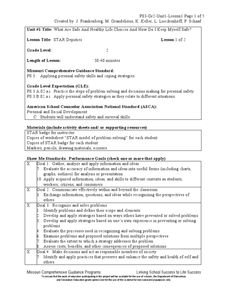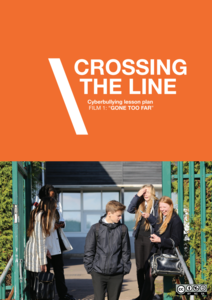Anti-Defamation League
Matthew Shepard and James Byrd, Jr., Hate Crimes Prevention Act
You, too, can prevent hate crimes! Middle and high schoolers read short biographies of Mathew Shepard and James Byrd, the two men for whom the Matthew Shepard and James Byrd, Jr. Hate Crimes Prevention Act (HCPA) is named. After learning...
Curated OER
Hate Crimes Legislation
Students investigate hate crime legislation. In this hate crime lesson, students examine the Matthew Shepard and James Byrd, Jr. Hate Crimes Prevention Act Students explore the fine between hate crime legislation and First Amendment...
Curated OER
National Crime Prevention Council
Young scholars explore appropriate lessons on crime prevention and safety. They encounter how to recognize bullying behavior and how to deal with it. Students access fair methods for settling conflicts. They identify trusted adults and...
Curated OER
A Civil Action
Students explore the roles of law enforcement officials, the news media, and civilians in crime prevention and criminal apprehension. They envision ways to build and strengthen community partnerships to address concerns about crime.
BBC
Crime
Crime and punishment! Learners discuss the law, civics, and crime in the UK. They brainstorm lists of crimes and possible punishments, complete activities on a website, role-play a Juvenile Court scenario, and try to think of ways they...
BBC
Crime: Justice
Are the juvenile courts fair? Learners read a bit from the classic Oliver Twist to consider how young people are treated and represented when they've been accused of a crime. They read a case study from their books, discuss children's...
Curated OER
Anti-Arab Stereotypes, Discrimination and Hate Crimes
Young scholars discuss the stereotypes they have heard mentioned against the Arab community. Using examples, they identify the uses of discrimination, hate crimes or stereotyping these individuals. As a class, they discuss ways to...
Curated OER
Another Look at School Safety
Students research crime and violence in their district, including finding out what has been discussed about safety and addition of surveillance cameras.Students conduct interviews and explore the legal issues involved. After all...
Curated OER
Lipstick Chromatography/Ink Chromatography
Junior crime scene investigators are instructed in two different chromatography exercises. For female suspects, they separate and compare lipstick pigments. For male suspects, they separate and compare ink samples. A data sheet is...
Curated OER
True Crime
Students discuss reasons for the increase in violent crime across the country. They examine the factors to which increases in violent crime can be attributed. Students brainstorm consequences of the forces that have led to the decrease...
Facing History and Ourselves
Justice After the Holocaust
Though there could be no true justice for the horrors of the Holocaust, many of those responsible for crimes against humanity were found guilty in the eyes of the law. Using primary and secondary sources in the 16th installment of a...
Teaching Civics
Legal Ways: Extended Jurisdiction Juvenile
An amazing set of resources! Found here are several lessons that work in conjunction to help learners better understand the juvenile court system. Learners review the judicial process, discuss how juveniles are tried, and hold a class...
Curated OER
STAR Deputies
Second graders engage in a lesson that is about the sharing of following rules to follow the law. They concentrate on the making of safe choices. Students use the examples to have class discussion. They also role play scenarios of making...
University of Southern California
Deconstructing Genocide: The Ultimate Crime Against Humanity
There are eight stages of an atrocity known as genocide, and it's important to understand how they are represented so we can fight against it in the future. As young historians watch video clips of ten Jewish Holocaust survivors'...
Curated OER
The Youth Criminal Justice Act
Students review the Youth Criminal Justice Act and examine the consequences for young people who commit crimes. They investigate the rehabilitation and reintegration processes associated with the act.
Curated OER
Why Does It Matter? Teaching Tolerance in an Unforgiving Society
Students listen to the song "Scarecrow" by Melissa Etheridge and draw what they think the song is about. They discover the song is about a man who was attacked. They again express their feelings about the song through drawing. Finally...
Curated OER
Respect
Young scholars, in groups, exchange their opinions and experiences on issues around respect and anti-social behavior. They come up with approaches to youth crime prevention and discuss and present their own solutions.
Curated OER
What Events Led to Lincoln's Assassination?
Fourth graders use primary and secondary sources to research the assassination of Abraham Lincoln. They identify arguments supporting and opposing the position that Lincoln's assassination could have been prevented and write a report...
Facing History and Ourselves
Continuing Lemkin's Legacy: What Can We Do to Prevent and Stop Genocide?
Young scholars investigate genocide. In this contemporary history lesson, high schoolers research Darfur advocacy organizations and present plans of action to stop the injustice in Darfur.
Curated OER
Rape: Psychology, Prevention and Impact
Learners are introduced to the characteristics of rape. As a class, they identify statements as either facts or myths about rape. In groups, they complete a survey to identify their own perceptions about rape and compare them with...
Curated OER
Crime and Justice
Students investigate what happens when someone is arrested. They engage in a mock trial role play about a burglary. They engage in the process of the Criminal Justice System from arrest to sentencing.
Facing History and Ourselves
Analyzing Historical Evidence
High schoolers examine World War I war crimes. In this world history instructional activity, students use primary and secondary sources to research and understand the systematic nature of the Armenian Genocide. High schoolers reflect on...
Facing History and Ourselves
American Responses to the Armenian Genocide
Young scholars examine World War I war crimes. In this world history instructional activity, students use primary and secondary sources to research and understand the action taken by the United States during the Armenian Genocide. Young...
Childnet International
Crossing the Line: Cyberbullying
Members of the LGBTQ community are more likely to be bullied online than their peers—and bystanders who do nothing can be as problematic as the bullies themselves. Middle schoolers explore ways to protect themselves and others on the...
Other popular searches
- Crime Prevention Stranger
- Drug and Crime Prevention
- Crime Prevention Scenario
- Crime Prevention Robbery

























